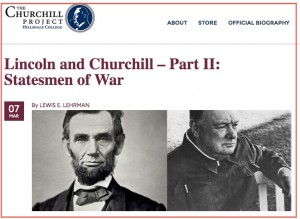Lehrman on Churchill and Lincoln
 Lewis E. Lehrman, co-founder of the Gilder Lehrman Institute of American History, offers a compelling two-part comparison of Abraham Lincoln and Winston Churchill at the Hillsdale College Churchill Project. (To read in entirety, start here.)
Lewis E. Lehrman, co-founder of the Gilder Lehrman Institute of American History, offers a compelling two-part comparison of Abraham Lincoln and Winston Churchill at the Hillsdale College Churchill Project. (To read in entirety, start here.)
Mr. Lehrman is author of Lincoln at Peoria: The Turning Point (2008) and Lincoln “by littles” (2013). Uniquely among the Lincoln scholars I’ve heard on Churchill, he has as fine a grasp of the English statesman as he does the American president. He tells me he regards each as the outstanding figure of his respective century. No argument there.
1. Lehrman on Preparation for Greatness
Excerpt: President Lincoln and Prime Minister Churchill found themselves challenged by wars of national survival. Even though their early lives appear to be different, there are similar aspects in their educational preparation.
“If a man will stand up and assert, and repeat and re-assert, that two and two do not make four, I know nothing in the power of argument that can stop him,” declared Abraham Lincoln at Peoria on 16 October 1854. In this case, he implied that Senator Stephen Douglas, his political adversary, made irrational arguments on the subject of slavery.
Young Lincoln never had much of a chance to study mathematics. In June 1860, Lincoln wrote to a journalist that “when I came of age I did not know much….I have not been to school since. The little advance I now have upon this store of education, I have picked up from time to time under the pressure of necessity.”
Mr. Churchill would echo these biographical remarks of Mr. Lincoln in his speech at the Mid-Century Convocation, Massachusetts Institute of Technology, on 31 March 1949: “I frankly confess that I feel somewhat overawed in addressing this vast scientific and learned audience.…I have no technical and no university education, and have just had to pick up a few things as I went along.” Read more….
2. Lehrman on Statesmen of War
Excerpt: “We cannot escape history,” President Lincoln declared in his Second Annual Message to Congress in December 1862. “We of this Congress and this administration, will be remembered in spite of ourselves. No personal significance, or insignificance, can spare one or another of us. The fiery trial through which we pass will light us down, in honor or dishonor, to the latest generation.”
Churchill, gifted historian that he was, learned lessons from the history he wrote. He certainly understood the importance of patience and hard work from writing his four-volume biography of John Churchill, First Duke of Marlborough. “The real reason why I succeeded in my own campaigns is because I was always on the spot—I saw everything, and did everything for myself,” the Duke had observed.
Lincoln’s memory was as good as Churchill’s, but Lincoln’s opportunity to study British history had been very limited. In February 1865, President Lincoln attended a peace conference in Hampton Roads, Virginia. After Lincoln set stiff Union conditions for any negotiations, one of the Confederate commissioners argued, as a precedent, that King Charles I had reached agreements with rebels during an English Civil War.
“I do not profess to be posted in history,” said Lincoln in concluding the discussion. “All I distinctly recollect about the case of Charles I is that he lost his head in the end.”
When it came to the future judgments of history, Winston Churchill had an advantage over Lincoln. “History will be kind to me for I intend to write it,” the British Prime Minister told World War II associates. Abraham Lincoln, however, had his own advantage. More even than Churchill, perhaps, Lincoln was attuned to the realities of the present and the promises of the future. In his 1862 Message to Congress, Lincoln revealed in a single line his ability to adapt to whatever came:
“As our case is new, so we must think anew and act anew.” Read in full…






